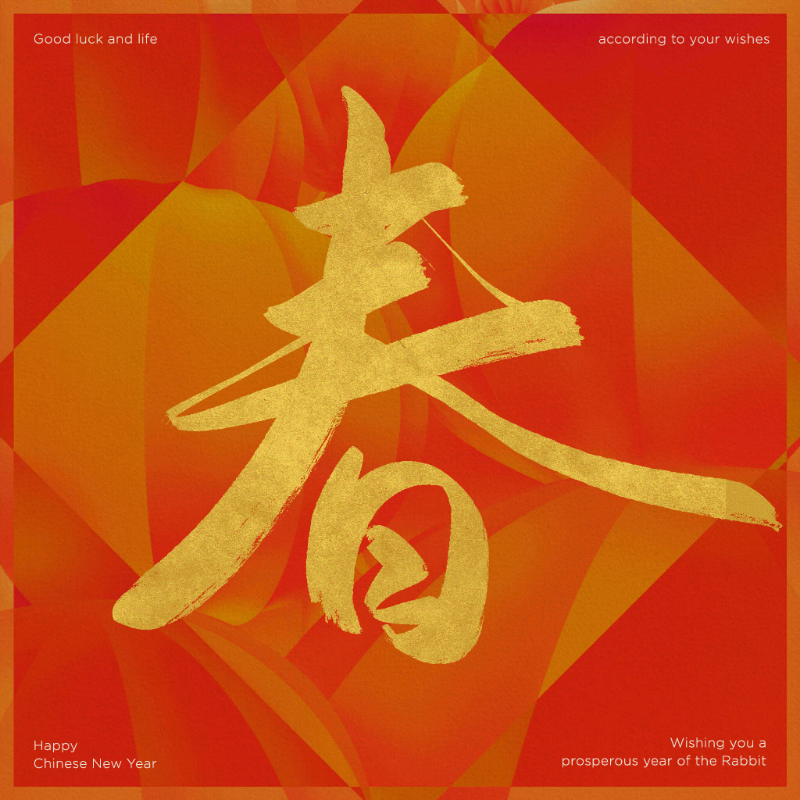
Spring Festival couplet 2023
written by Kyle Huang
Happy Chinese New Year!!
Chinese New Year, also known as Spring Festival or Lunar New Year, is a major festival celebrated by Chinese people worldwide. It marks the start of the lunar calendar and is traditionally a time for families to gather, clean their homes, and decorate with symbols of good luck and prosperity. The festival typically lasts for 15 days and includes various customs such as lion and dragon dances, fireworks, and the exchange of red envelopes filled with money. It is considered the most important holiday in China and is celebrated by Chinese communities around the world.
The Chinese character "春" (chūn) is used in the name of the Chinese New Year, "春節" (Chūn Jié) because it symbolizes the beginning of spring. Spring is a time of renewal, growth, and new beginnings, which aligns with the themes of the Chinese New Year festival. The festival marks the end of the cold winter and the start of a new year, a new season and a new cycle of life. The character "春" also implies hope, optimism, and positive energy, which is what people hope to bring into the new year through the celebration of the festival.
The Chinese character "春" (chūn) is traditionally flipped upside-down during the Chinese New Year and other special occasions, particularly as a form of decoration. The upside-down character is known as "倒" (dào) or "倒春" (dào chūn) which means "upside-down" or "inverted." The reason behind this tradition is rooted in Chinese wordplay and puns. The character "倒" (dào) sounds similar to the word "到" (dào) which means "to arrive." Therefore, flipping the character "春" upside-down to "倒" implies that spring has arrived and the new year is here. It also symbolizes the arrival of good luck and fortune. Additionally, the upside-down "春" is a reminder of the Chinese saying "倒春寒" (dào chūn hán) which means "upside-down spring" and is used to describe the phenomenon of a cold spell during the spring season.
Thus, in this collection, you can see a lot of flipped characters, representing the arrival of different wishes. For example:
"福" (fú) which means "good luck" or "fortune", it is also often flipped upside-down as a symbol of good luck and fortune.
"禄" (lù) which means "official salary" or "happiness" is also flipped upside down as a symbol of prosperity.
"寿" (shòu) which means "longevity" is also flipped upside-down as a symbol of a long life.
Or, you can have "TEZOS" flipped and wish to make tons of $xtz in 2023.
In addition, the spring couplet is a traditional Chinese poetry form that is often used as a decorative element during the Chinese New Year and other special occasions. It is typically written on red paper and displayed on the sides of gates or doorways as a symbol of good luck and fortune. The themes of spring couplets often include wishes for prosperity, longevity, and good health. They can be used to decorate your home, or office or to give as a gift for family and friends.
The 'Spring Festival Couplet 2023' collection features a diverse selection of spring couplets. Collectors can also find idiomatic phrases incorporated into the couplets, such as:
"春風得意" (chūn fēng dé yì) is a Chinese idiomatic phrase that literally means "spring breeze gets its wish." The phrase is used to describe a sense of elation and contentment that comes from achieving one's goals or having things go according to plan. The spring breeze is a metaphor for a feeling of lightness, happiness, and well-being, while the phrase "得意" (dé yì) is used to express satisfaction and triumph.
"招財進寶" (zhāo cái jìn bǎo) is a Chinese idiomatic phrase that literally means "inviting wealth and treasure in." The phrase is used to express the idea of attracting wealth and prosperity. The character "招" (zhāo) means "to invite" or "to attract," while "財" (cái) means "wealth" or "money," and "寶" (bǎo) means "treasure" or "valuable." The phrase is often used as a symbol of good luck and prosperity and is frequently displayed in homes and business during the Chinese New Year and other festivals. It is a way to express the hope of attracting wealth and good fortune in the coming year.
"秋月春風" (qiū yuè chūn fēng) is a Chinese idiomatic phrase that literally means "autumn moon and spring breeze." The phrase is often used to describe a sense of balance and harmony between opposing elements. The autumn moon and spring breeze are both natural phenomena that occur at different times of the year, the autumn moon is associated with the end of the year and the spring breeze with the beginning of the year.
"春夏秋冬" (chūn xià qiū dōng) is a Chinese idiomatic phrase that literally means "spring, summer, autumn, winter." It is used to represent the four seasons of the year, and it is often used as a metaphor to represent the cycles of life, the passage of time, and the change of things. It can be used to express the idea that life is constantly changing and that everything has a beginning and an end. The phrase is often used to indicate that time passes quickly and that life is short. It can also be used to express the idea that life is full of ups and downs, and that one must be prepared for both good times and bad.
Belows are more explamples. The collection is full of endless opportunities to explore!
春夏秋冬; 春花秋月; 秋月春風;
春去夏來; 春去秋來; 春去冬來;
春風風人; 下雨雨人; 春風得意;
招財進寶; 春風富貴
project name project name project name
The collector of this collection will be eligible for my next collection 'Lantern riddles'. Collect and trade wisely ;) Wishing you a prosperous and successful 2023!
